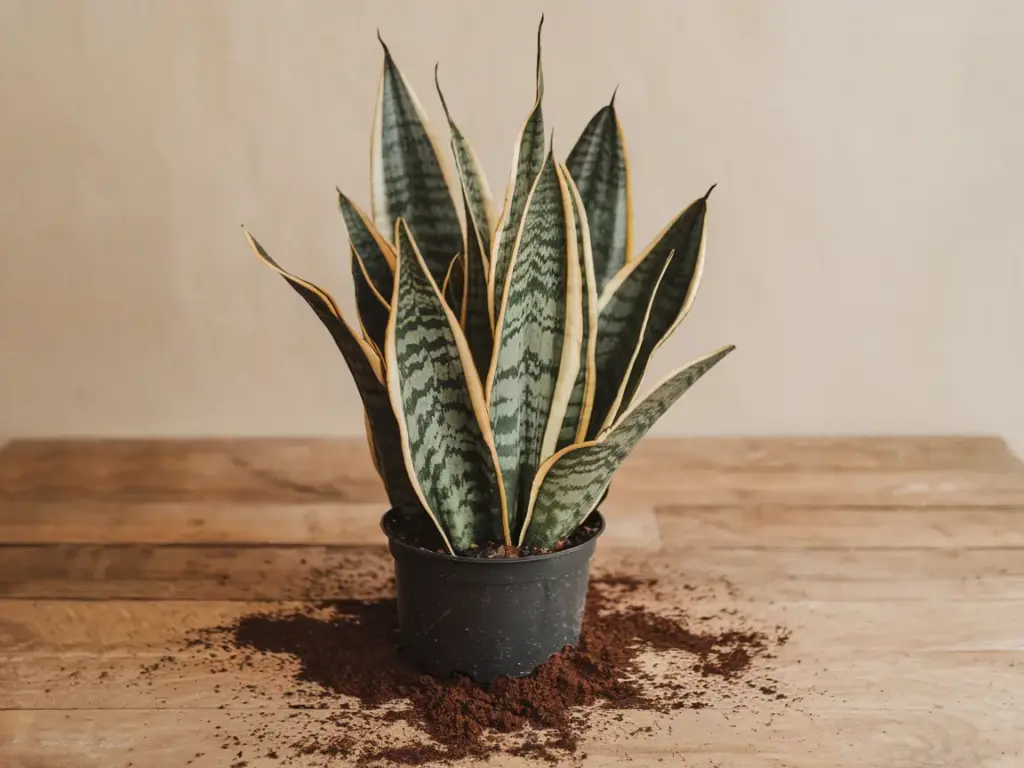#2 – Snake Plant (Sansevieria): The Surprising Coffee Ground Champion

Talk about a plant that totally surprised me! While my Peace Lily’s love for coffee grounds was somewhat expected, my Snake Plant’s transformation left me absolutely speechless. After 15 years of growing these supposedly “indestructible” plants, I never thought they could look even better until I started my coffee ground experiment.
The Unexpected Benefits for Snake Plants
Here’s what shocked me most: despite being known as a low-maintenance succulent, Snake Plants actually possess a secret appetite for nutrients. The nitrogen and potassium in coffee grounds support their structural growth in ways I’d never seen before. My oldest Snake Plant literally grew three new leaves within a month of starting coffee ground treatments!
The Perfect Coffee Ground Formula for Snake Plants
Since Snake Plants are prone to root rot, you’ve got to be extra careful with application. Here’s my tried-and-true method:
- Use 1 tablespoon of dried grounds per gallon of potting mix
- Mix grounds thoroughly with fresh soil during repotting
- Apply as a top dressing only once every 3 months
- Ensure excellent drainage with extra perlite
Impact on Soil Structure
One of the coolest things I discovered was how coffee grounds improved my Snake Plant’s soil quality. They:
- Create better air pockets for root growth
- Improve water retention without risking rot
- Add beneficial microorganisms
- Help prevent soil compaction
Reading Your Snake Plant’s Response
Let me tell you about the signs that showed me my Snake Plant was loving its coffee treatment:
- Thicker, more upright leaves
- Deeper green coloration
- New pups sprouting more frequently
- Faster overall growth rate
- Improved leaf firmness
Watch Out for These Signs
Of course, I made some rookie mistakes along the way. Here are the warning signals I learned to watch for:
- Soft, mushy stems (too much moisture retention)
- Yellowing leaves (potential overfeeding)
- Slow growth (might need to adjust amount)
- Root discoloration during repotting
Pro Tips from My Experience
After lots of trial and error, here’s what works best:
- Always mix grounds with chunky, well-draining soil
- Use grounds only during active growing season
- Reduce watering frequency when using grounds
- Monitor the soil’s moisture level carefully
My favorite hack? I create a coffee ground mulch by mixing dried grounds with orchid bark. This gives my Snake Plants the perfect balance of nutrients and drainage. The results have been absolutely incredible for vertical growth!
Want to see another amazing coffee ground transformation? Wait until you hear about my Philodendron! Click the next button to learn how this vining beauty doubled its growth rate with my special coffee ground mixture. I’ll share the exact recipe that turned my regular Philodendron into a lush, cascading masterpiece in just three months!











GIPHY App Key not set. Please check settings